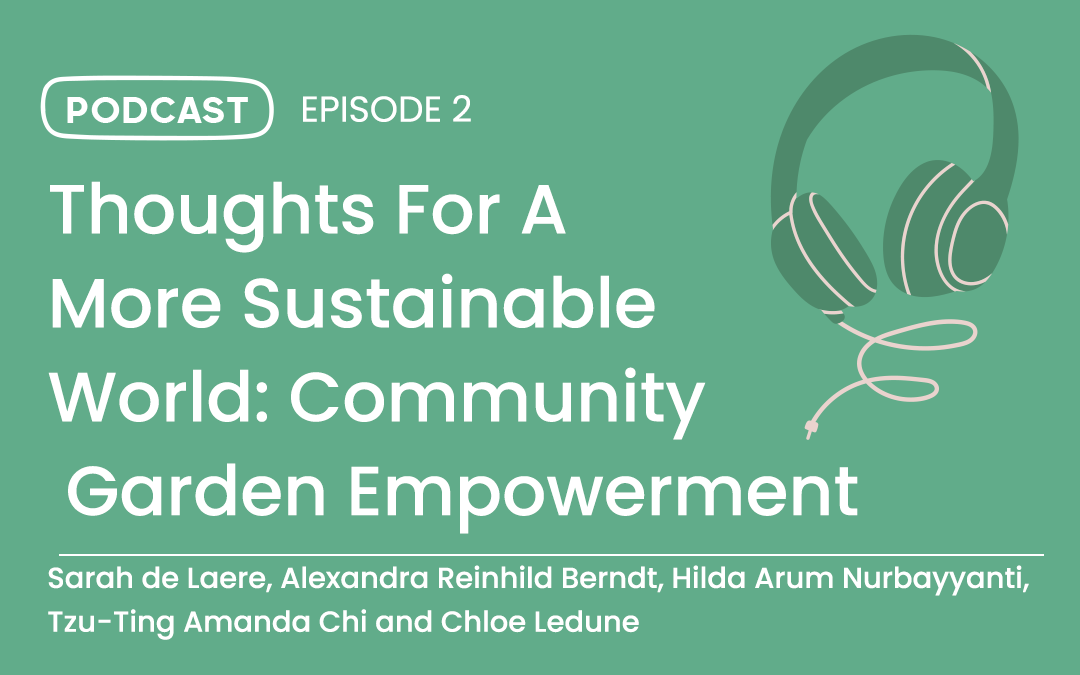Thoughts For A More Sustainable World: Community Garden Empowerment
Abstract
This podcast focuses on how community garden can be empowering in different domains such as education, well-being, and social integration. By sharing stories from different community gardens around the world, we present you how community gardens can help to better understand the value of food, improve people’s mental health, help to bring different people from diverse backgrounds together who would otherwise not have met, and much more.
SDGs that inspired our podcast
This podcast is inspired by the Sustainable Development Goals, in particular No.11: sustainable cities and communities and No.12: responsible consumption and production. Not only does the community garden contributes to urban green space, improving local biodiversity and microclimates, but it also helps to reduce inequality since the garden can empower people who may have been previously excluded from the community, such as those with low-income and with different cultural backgrounds. In this sense community gardens also contribute to SDG 10: reduced inequalities. Furthermore, community garden strives to educate people on the value of food, sustainable food system and the carbon footprint related to food production and transportation. It offers the opportunity for people to grow their own food and thus produce and consume food in a more sustainable way.
Work process/division of labour
1. Podcast preparation – Podcast script
At first, we separated the podcast script into five parts: introduction, education, well-being, cultural integration, outro. Amanda wrote the script for the introduction, Hilda wrote the script for the education part, Sarah wrote the script for the well-being part, Alexandra wrote the script for the cultural integration part and Chloe wrote the script for the outro. Writing the script also entailed the research part for the script. We then met all together and discussed how to make the whole script smoother and easier to listen to.
2. Podcast production
For the podcast production we all met. Each of us was involved in the podcast production. Each one of us also had several parts in the podcast discussion – It is possible to listen to all our voices.
3. Podcast editing
For the podcast editing, we all met after the peer feedback to implement changes. Amanda, Chloe, Hilda, Alexandra wrote new scripts and did new recordings: Together we added a part in the introduction as our peer review group advised us to give an overview over the topics and examples we give. We added also new parts regarding the SDGs as the peer review groups asked us to explain how exactly the several projects link to the SDGs. Furthermore, we added a new part on the involvement of the government – and also added a part that links this involvement of the government to the concept of bottom-linked projects. The rough editing was done by Hilda and the detailed editing was done by Chloe.
Written document
Written document: Alexandra
Edited: Amanda and Sarah
Credits
Background music references:
JuliusH. (n.d.). Fly up to the sky. Retrieved from https://pixabay.com/fr/music/optimiste-fly-up-to-the-sky-4661/
Virtuosound. (n.d.). Chill Lofi Song. Retrieved from https://pixabay.com/fr/music/beats-chill-lofi-song-8444/
General references:
Booth, J. M., Chapman, D., Ohmer, M. L., Wei, K. (2018). Examining the relationship between level of participation in community gardening and their multiple functions. Journal of Community Practice 26(1), 5-22.
Draper, C., & Freedman, D. (2010). Review and analysis of the benefits, purposes, and motivations associated with community gardening in the United States. Journal of Community Practice, 18(4), 458-492.
Eco learning camp (2022). Kegiatan Edukasi eco camp. Retrieved from http://ecolearningcamp.org/program/#1528444972617-da4ea65f-b12a
Fernandez, M. (2003). Cultivating community, food, and empowerment: Urban gardens in New York City.
Food Ethics Council (2022). Valuing our food. Retrieved from https://www.foodethicscouncil.org/theme/valuing-our-food/
Huerto de la familia (2022). Welcome to Huerto de la Familia (The Family Garden). Retrieved from https://huertodelafamilia.org/
Incredible Edible (2022). Our incredible history. Retrieved from https://www.incredibleedible.org.uk/our-story/
Karge, T. (2018). Placemaking and urban gardening: Himmelbeet case study in Berlin. Journal of Place Management and Development 11(2), 208-222.
Kearney, S. C. (2009). The community garden as a tool for community empowerment: a study of community gardens in Hampden County.
Koay, W. I., & Dillon, D. (2020). Community gardening: Stress, well-being, and resilience potentials. International Journal of Environmental Research and Public Health, 17(18), 6740.
Slater, R. J. (2001). Urban agriculture, gender and empowerment: An alternative view. Development Southern Africa 18(5), 635-650.
TEDx Talks (2012). Ted Talk: Pam Warhurst – how we can eat our landscapes. Retrieved from https://www.youtube.com/watch?v=vqhx4Etdvr0
TEDx Talks (2015). Building community one garden at a time. Retrieved from https://www.youtube.com/watch?v=4oYIo3YvdPc&t=488s
TEDx Talks (2019). How community gardens preserve culture and grow hope. Retrieved from https://www.youtube.com/watch?v=8bB6jtGylsI
The Conversation (2022). The Pandemic’s gardening boom shows how gardens can cultivate public health. Retrieved from https://theconversation.com/the-pandemics-gardening-boom-shows-how-gardens-can-cultivate-public-health-181426
United Nations (2022). Food systems summit x SDGs. Retrieved from https://www.un.org/en/food-systems-summit/sdgs
United Nations (2022). Reduce inequality within and among countries. Retrieved from https://sdgs.un.org/goals/goal10
United Nations (2022). Make cities and human settlements inclusive, safe, resilient and sustainable. Retrieved from https://sdgs.un.org/goals/goal11
World Food Programme (2020). 5 facts about food waste and hunger. Retrieved from https://www.wfp.org/stories/5-facts-about-food-waste-and-hunger
